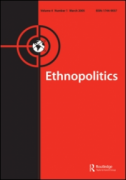Co-edited with Florian Bieber, this special issue was published by Ethnopolitics in 2005. It features a conceptual discussions and case studies that focus on the evolution of electoral systems in seven countries around the world, from Belgium to Trinidad and Tobago. In some cases, such as Rwanda, experiments with multiparty elections in the post-genocide context of the country are recent, whereas in other cases, such as Guyana, elections discussed here date back several decades. The cases demonstrate that the ethnopolitical dynamics of elections are best understood in the context of the evolution of electoral systems, and not just by a snapshot analysis of their technical design.
Understandably, much discussion on electoral systems in recent years has focused on the institutional design component: academic and policy-oriented research has made significant contributions to devising new electoral systems to ‘manage’ democracy and diversity in post-conflict divided societies, ranging from South Africa to Bosnia and Iraq. Whereas the choice of the electoral system is obviously crucial in setting the framework for the emergence of a stable democratic process and its ability to manage existing divisions peacefully within such societies, only the passing of time can provide more insight into the effectiveness of electoral rules and the evolving relationship between democracy and identity.

